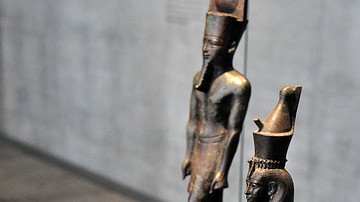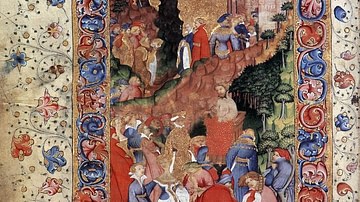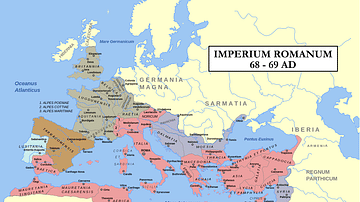Review

| Rating: | |
|---|---|
| Title: | Nero: Emperor and Court |
| Author: | John F. Drinkwater |
| Audience: | Professional |
| Difficulty: | Medium |
| Publisher: | Cambridge University Press |
| Published: | 2019 |
| Pages: | 457 |
The author presents a new Nero different from the Roman emperor's image in traditional sources and modern popular depictions. John Drinkwater argues that Nero is not as villainous as many have portrayed him. Instead, Nero's closest family members and associates were also responsible for his actions. "Nero: Emperor and Court" is for serious scholars and students of Classics and History.
Of the many emperors of Rome, there is one who has been given considerable attention and is often portrayed in a negative light. In Nero: Emperor and Court, John F. Drinkwater challenges the traditional notions attributed to Nero and offers a revisionist approach to studying the emperor's family and personal histories. This book provides new research on Nero's life and brings to discourse the reasoning behind the common evil stereotypes attributed to Nero.
Drinkwater is Emeritus Professor of Roman Imperial History at the University of Nottingham. Much of his previous work has been on Roman imperial history, with a particular focus on the Roman West and Roman Gaul. In this book, Drinkwater states in the opening that it is not a "life and reign" (1). He aims to understand the Neronian Age and how the empire was governed not only by Nero but also by those involved with him. Drinkwater attempts to construct a new Nero, someone portrayed less negatively than his appearance in other Roman sources that modern readers base their perceptions on. To Drinkwater, Nero was, firstly, a young man unwilling to become an emperor.
In the book's first part, the author discusses Nero's background and lists the emperor's accomplishments. Accompanying these are the conversations on the misdeeds that he is often associated with, such as the murders of Claudius, Britannicus, Octavia, Seneca, and Poppea as well as the persecution of Christians. Drinkwater argues that this persona of Nero is the emperor in the eyes of his opponents, thus he should be revisited without going through the subjectivities and biases of Nero's contemporaries. The author gives further background on Agrippina, Nero’s court, Roman literature, and the politics and foreign policies of his time.
Much of the author’s arguments try to clear Nero from his crimes. For example, Drinkwater exonerates Nero from the aforementioned deaths of Claudius, Britannicus, and others. The author cites Suetonius as a hostile source who claimed that Antonia, his cousin and adoptive sister, was executed because she rejected Nero's hand in marriage. Drinkwater, on the other hand, claims that it was because Antonia was involved in the Pisonian Conspiracy. The author's assessment of the Pisonian Conspiracy was thorough and completed with a chart of all conspirators involved.
Drinkwater does not completely disassociate Nero from the executions. Instead of saying that Neronian Rome engaged in mass and nondiscriminatory slaughter, the book builds the argument that Nero's government acted harshly and bloodily toward specific entities in the empire. Furthermore, in Drinkwater's view, Nero is discharged from acting rashly and impulsively during the execution of his mother, arguing that she was a threat to him and he had to take action. Drinkwater admits Nero was “guilty of manslaughter” when he kicked Poppea to death while she was pregnant with his child.
The book ends with Nero’s final days and his untimely death. Drinkwater's ultimate conclusion is that his portrayal of Nero “is neither the Nero of the main source tradition nor that of most modern reconstructions” (416). Many of those involved, such as Nero's mother, the court, etc., played important roles in Nero's regime and the shaping of his persona. This makes Nero: Emperor and Court different from other scholarly works on Nero because much of what we traditionally know is from the voices of hostile Roman sources, such as Tacitus and Cassius Dio, and modern fiction writers. This book, aimed at scholars and students of Roman history, is highly recommended for its bold challenge against the popular perceptions of Nero today.
Cite This Work
APA Style
Mathew, P. (2023, December 13). Nero: Emperor and Court. World History Encyclopedia. Retrieved from https://www.worldhistory.org/review/388/nero-emperor-and-court/
Chicago Style
Mathew, Philip. "Nero: Emperor and Court." World History Encyclopedia. Last modified December 13, 2023. https://www.worldhistory.org/review/388/nero-emperor-and-court/.
MLA Style
Mathew, Philip. "Nero: Emperor and Court." World History Encyclopedia. World History Encyclopedia, 13 Dec 2023. Web. 30 Mar 2025.




